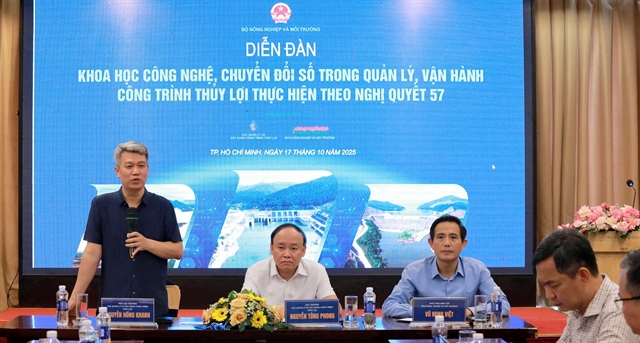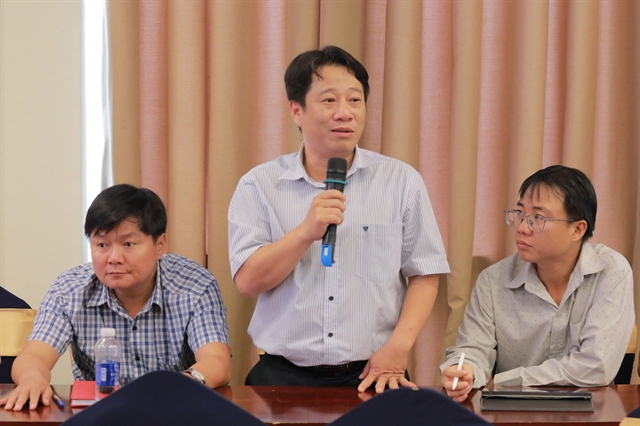 Economy
Economy


|
| Lê Xuân Thái, head of the Khánh Hòa Sub-Department of Irrigation, shares challenges in irrigation management in the province. — Photo: Nguyễn Thủy |
HCM CITY — Digital transformation is emerging as a key driver for the irrigation sector to develop sustainably, operate safely, and effectively adapt to climate change.
This message was underscored at the forum “Science, Technology, and Digital Transformation in the Management and Operation of Irrigation Works in Alignment with Resolution 57” held in HCM City on October 17 by the Nông nghiệp và Môi trường (Agriculture and Environment) newspaper and the Department of Irrigation Works Management and Construction under the Ministry of Agriculture and Environment.
Speaking at the forum, Vũ Minh Việt, deputy editor-in-chief of the newspaper, said: ”Amidst worsening climate change, water scarcity, and growing water demand, embracing science, technology, and digital transformation in irrigation management has become an urgent need.”
Developing a modern, flexible irrigation system that ensures water supply and drainage, supports socio-economic development, and guarantees water security and national interests is the goal of the Irrigation Development Strategy to 2030, with a vision toward 2045, he said.
To realise this, science, technology, and digital transformation serve as breakthrough drivers for forecasting, monitoring, and delivering intelligent irrigation services, he added.
In recent years, integrated monitoring systems with sensors and real-time data connections have improved management efficiency while reducing costs. Artificial intelligence (AI) and big data are being piloted to automatically collect and standardise water resource data, building a connected database that supports smart irrigation for both citizens and businesses.
Nguyễn Mạnh Hùng, head of the department’s Operations and Irrigation Management Division, said that applying digital technologies has yielded visible results. Regularly updated data on water resources enable localities to plan irrigation schedules, reduce drought and salinity risks, and improve water use efficiency. This aligns with Politburo Resolution No. 57-NQ/TW, which highlights science and innovation as strategic breakthroughs for governance and development.
However, he noted that many irrigation systems remain manually operated, with fragmented data not connected in real time.
To address this, the Ministry of Agriculture and Environment approved the development of the Vietnam Water Resources Information System (VN-WIS), a unified national data platform integrating AI, IoT, Big Data, GIS, and Digital Twin technologies. VN-WIS enables continuous updates on weather, rainfall, tides, and reservoir capacity, supports decision-making and real-time monitoring of irrigation works, and enhances forecasting and early warning capabilities.
The department is also promoting public–private partnerships and collaborating with enterprises, research institutes, and international organisations such as FAO, the World Bank, and JICA for technology transfer and digital skills training.
“Our goal is to build a modern, transparent, and resilient irrigation sector in the digital era,” Hùng said.
Innovative solutions from research and enterprises
At the forum, research institutes and businesses showcased a wide range of technologies applied in the sector.
The Vietnam Academy for Water Resources introduced a Hybrid AI model that predicts upstream flows 7–30 days in advance, along with a mobile app providing real-time irrigation data. It is also developing a Digital Twin system for sustainable water management in the Mekong Delta.
The Southern Campus of Thuyloi University presented a Data Mesh–based system that automatically collects and standardises multi-source data in real time, enabling transparent data sharing and advancing Water 4.0 management.
RYNAN Technologies Vietnam JSC showcased its AIoT-based smart water management ecosystem for climate-resilient agriculture. The system monitors environmental indicators such as salinity, pH, and dissolved oxygen in real time and uses machine learning to forecast anomalies and issue early warnings. Deployed widely in the Mekong Delta and exported abroad, it helps farmers adapt to natural hazards, optimise water use, and improve yields.
Addressing ongoing challenges

|
| Lê Xuân Thái, head of the Khánh Hòa Sub-Department of Irrigation, shares challenges in irrigation management in the province. — Photo: Nguyễn Thủy |
Localities also shared challenges in adopting digital transformation. Mai Hồng Tâm, deputy head of the Cần Thơ Sub-Department of Irrigation, said that after merging with Hậu Giang and Sóc Trăng, the city manages extensive irrigation infrastructure, from canals and sluices to pumping stations and drainage systems. However, technology application remains fragmented and lacks synchronisation.
Lê Xuân Thái, head of the Khánh Hòa Sub-Department of Irrigation, noted that although Supervisory Control and Data Acquisition (SCADA) systems were installed in major reservoirs in the early 2010s, many devices later became inoperative due to unstable maintenance funding and unclear spending standards. He proposed developing specific maintenance standards and budgeting guidelines to ensure the maintenance of these systems.
Thái also cited the lack of uniformity in software and equipment. “In Khánh Hòa alone, there are more than 10 different monitoring applications using separate software, which complicates operations and management,” he said.
He proposed establishing a unified national standard for applications and equipment used in the sector to improve management efficiency and ease the burden on local authorities.
In his closing remarks, Nguyễn Tùng Phong, Director of the Department of Irrigation Works Management and Construction, said the agency will coordinate with the Digital Transformation Department to develop technical standards and a comprehensive database for two-way data sharing between central and local levels.
He urged sectors and localities to work closely together to develop an intelligent, adaptive, and sustainable irrigation system in the digital age. — VNS




